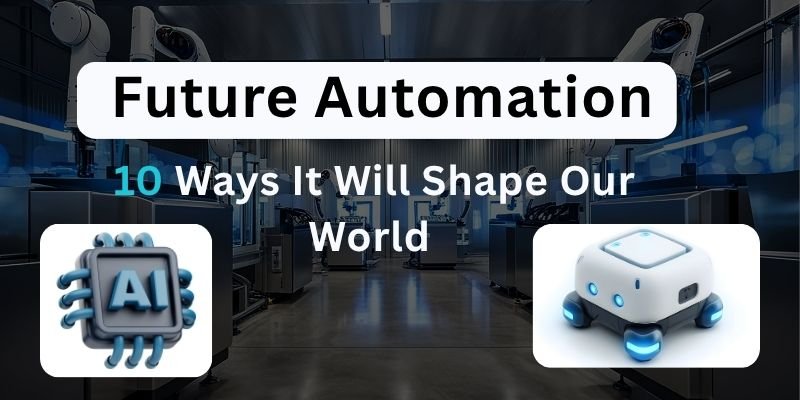Introduction
With future automation at its core, the world is evolving more quickly than ever before. Automation is permeating every aspect of our lives, from how we work to how we buy to how we live. Future automation, according to many analysts, will cause significant changes in sectors, occupations, and lifestyles during the next several years.
Some of these changes are already being felt by people in the USA, UK, Canada, and Australia. Automation in the workplace, self-driving vehicles, smart homes, and artificial intelligence technologies are not just futuristic concepts; they are now a reality and growing.
The meaning of future automation, its effects on our everyday lives, the industries it will change, and the opportunities and difficulties it will present will all be thoroughly examined in this piece. This book will assist you in understanding how automation is influencing the future, regardless of whether you are a student, company owner, or simply interested in the future.
What is Future Automation?
The next generation of technology that can complete activities with little to no human involvement is referred to as future automation. Automation is already present in places like customer service, banking, and internet shopping. Future automation, however, will be considerably more sophisticated, utilizing robots, artificial intelligence, and machine learning to solve issues, make judgments, and even anticipate human needs.
This is not limited to factory robots. Everything from healthcare to education will be impacted by future automation, which will make systems more intelligent and effective.
Why Future Automation Matters
Automation in the future is important because it will alter the way we live, work, and engage with the outside world. Automation will be used by businesses to increase productivity and reduce expenses. It will be used by governments to enhance public services. People will utilize it on a regular basis to save time and live more comfortably.
Imagine waking up in a smart house where AI controls your schedule, your car takes you to work, and your coffee is produced automatically. This is how future automation will be powerful.

The Evolution of Automation
From Hand Labor to Machines
Everything was done by hand in the past. Machines that may increase manufacturing speed were introduced during the industrial revolution. This marked the beginning of automation.
The Revolution in Digital
Automation entered homes and workplaces with computers. Letters were replaced by email, bank visits were replaced by online banking, and lengthy shopping excursions were replaced by e-commerce.
Artificial Intelligence’s Ascent
AI has made automation more intelligent than before. AI is capable of self-improvement, learning from data, and even making decisions on its own. This is the starting point for future automation.
Future Automation in Daily Life
Intelligent Houses
Smart homes will continue to evolve. Security, heating, and lighting will all be automated. Future automation will make life more comfortable by enabling houses to understand human behaviors.
Medical Care
To diagnose and treat patients more quickly, doctors will employ automation. Artificial intelligence will evaluate patient data to improve outcomes, and robots may help with surgery.
Mobility
Drones and self-driving automobiles will revolutionize delivery and travel. Transportation will become safer, quicker, and more environmentally friendly with future automation.

Future Automation in the Workplace
Virtual offices and remote work
Global virtual team management will be aided by automation. AI systems will plan meetings, compile notes, and monitor tasks.
Industry and Manufacturing
Robots that operate continuously will be used in factories to cut expenses and mistakes. Breakdowns will be avoided before they occur thanks to predictive maintenance.
Client Support
The majority of consumer inquiries will be handled by chatbots and AI helpers, freeing up humans for more difficult jobs.
Benefits of Future Automation
- saves money and time.
- increases precision
- minimizes human error
- Boosts output
- opens up additional possibilities
Challenges of Future Automation
Concerns About Job Loss
The possibility of automation replacing human labor is one of the main concerns. New employment will be generated, while some positions may be destroyed.
Security and Privacy
Data is essential to automation. In the future, safeguarding such data will be quite difficult.
Human Management
People must make sure they maintain control over increasingly intelligent machines and that automation benefits humans.
Future Automation in Key Industries
Learning
AI instructors will tailor each student’s education. Teachers will be able to concentrate more on creativity and mentoring as a result of future automation.
Money
AI will be used by banks to handle investments, identify fraud, and offer immediate customer service.
Stores
Future automation will enable stores to anticipate consumer preferences, replenish inventory automatically, and expedite delivery.
The Role of AI in Future Automation
The power underlying future automation is artificial intelligence. Machines can only obey predetermined rules in the absence of AI. AI enables automation to grow, adapt, and learn.
How Future Automation Affects You
Your everyday life will be impacted by future automation, regardless of where you live—in the UK, the USA, Canada, or Australia. Automation will permeate every aspect of life, from access to healthcare to workplace equipment.
Preparing for the Future of Automation
People ought to pick up new automation-related skills. For instance, repetitive jobs will be less significant than creativity, critical thinking, and emotional intelligence.

FAQs
1.Future automation: what is it?
The next technological advancement, known as “future automation,” will allow AI and machines to perform activities with little to no assistance from humans.
2. Will employment be lost to future automation?
The IT and creative industries will see the creation of numerous new employment in addition to the replacement of some existing ones.
3. How will everyday living be impacted by future automation?
It will speed up healthcare, make houses smarter, and make transportation safer.
4.In a world of future automation, what abilities will be crucial?
Emotional intelligence, creativity, and critical thinking will be useful.
5.Which sectors stand to gain the most from future automation?
There will be significant advantages for industry, healthcare, banking, education, and retail.
Conclusion
Automation in the future involves more than simply machines and robots. It is about a more intelligent, effective society where technology fosters human development. Automation has many advantages, but there are drawbacks as well, such as privacy concerns and employment changes.
The future will be more fun, quicker, and brighter if we start preparing now. The next phase of human history is being shaped by future automation, which is here to stay.



